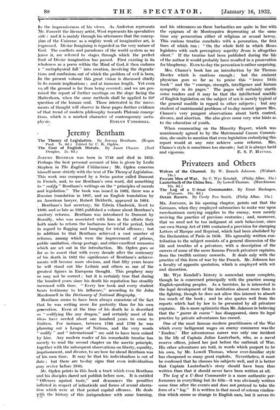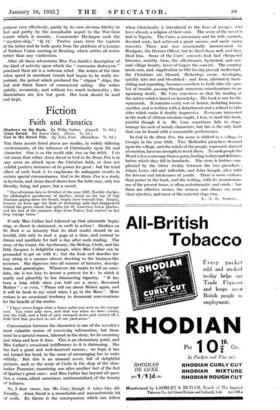Privateers and Others
Wolves of the Channel. By W. Branch Johnson. (Wishart.
18s.) Private Men of War. By C. Wye Kendall. (Philip Allan. 15s.) Lauterbach of the China Sea. By Lowell Thomas. (Hutchinson.
10s. 6d.) The Log of a U-boat Commander. By Ernst Hashagen.
(Putnam. 10s. Bd.) Ocean Racers. By Cicely Fox Smith. (Philip Allan. 15s.)
Mn. JOHNSON, in his opening chapter, points out that the Germans, when they employed submarines to make war upon merchantmen carrying supplies to the enemy, were merely reviving the practice of previous centuries ; and, moreover, that we need not be too indignant at such behaviour, since our own Stamp Act of 1891 contained a provision for stamping Letters of Marque and Reprisal, which had been abolished by the Declaration of Paris in 1856. His agreeably written con- tribution to the subject consists of a general discussion of the life and troubles of a privateer, with a description of the careers of some of the more famous French privateer captains, from the twelfth century onwards. It deals only with the practice of this form of war by the French. Mr. Johnson has a faculty of apposite quotation, which is employed with wit and discretion.
Mr. Wye Kendall's history is somewhat more complete, though he is concerned principally with the practice among English-speaking peoples. As a barrister, he is interested in the legal development of the institution almost more than in the fighting, though he does not allow this interest to absorb too much of the book ; and he also quotes well from the reports which had by law to be presented by all privateer captains. He is more optimistic than Mr. Johnson in believing that the "guerre de course" has disappeared, since its legal practice by private adventurers has ceased.
One of the most famous modern practitioners of the War which every belligerent wages on enemy commerce was the Emden.' Her adventurous career was only one incident in the life of Captain Julius Lauterbach, who, as a naval reserve officer, joined her just before the outbreak of Wan His other adventures are told, in words which purport to be his own, by Mr. Lowell Thomas, whose over-familiar style has cheapened so many great exploits. Nevertheless, it must be confessed that he chooses his subjects well, and it is better that Captain Lauterbach's story should have been thus written than that it should never have been written at all.
The Log of a U-Boat Commander is a more authentic per- formance in everything but its title—it was obviously written some time after the events and does not pretend to take the form of a " log." It is written in that mood of solemn vindica- tion which seems so strange to English ears, but it serves its
purpose very effectively, partly-by its own obvious fidelity to fact and partly by the remarkable sequel to the War-time events which it records. Commander Hashagen sank the " mystery-ship," ' Q. 122 Twelve years later the captain of the latter and he both spoke from the platform of a.League of Nations Union meeting at Reading, which settles all scores better than any vindication.
After all these adventures Miss Fox Smith's description of the kind of activity upon which the " commerce destroyers " practised their art is a welcome relief. She writes of the time when speed in merchant vessels had begun to be really im- portant, the period which produced the " clipper " ships, the last and finest flower of commercial sailing. She writes quietly, accurately, and without too much technicality ; the illustrations are few but good. Her book should be read and kept.



































 Previous page
Previous page